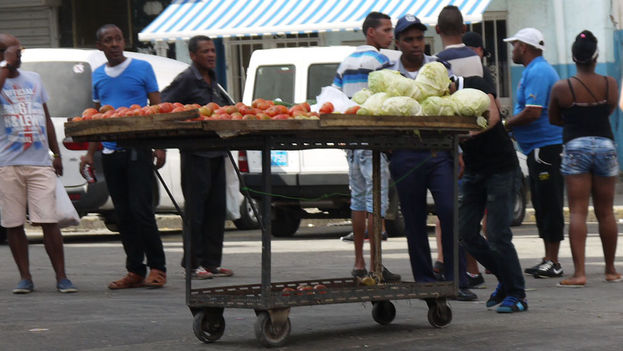
![]() 14ymedio, Pedro Campos, Havana, 2 March 2016 — State inspectors supported by groups of police launched an offensive against merolicos – hucksters – who, in different parts of Havana, sell a large array of widely used items missing in the military’s monopoly of hard currency stores formally known as “Hard Currency Collection Stores” (TRDs). The goods sold by the street vendors arrive from the Unites States via charter flights in the luggage of “mules.”
14ymedio, Pedro Campos, Havana, 2 March 2016 — State inspectors supported by groups of police launched an offensive against merolicos – hucksters – who, in different parts of Havana, sell a large array of widely used items missing in the military’s monopoly of hard currency stores formally known as “Hard Currency Collection Stores” (TRDs). The goods sold by the street vendors arrive from the Unites States via charter flights in the luggage of “mules.”
These are items such as pasta, toothpaste, batteries, skin creams, sunglasses, electric showers and spare parts, pens, wall-mounted TVs, nail clippers, eyebrow pencils, facial compacts, deodorant, plastic sandals, wallets, bottles, teapots and a thousand other articles.
A few days ago I was in one of the areas usually frequented by hucksters trying to find some batteries I needed for the TV remote and I asked a girl sitting on the sidewalk what had happened to the costume jewelry vendors who usually crowded around there. She replied laconically, “They declared war on us.” The terminology made me anxious. But what they did was the closest thing to war, according to what she told me; armed inspectors and police arrived and went after the merchandise and the merchants.
On the other hand, rumors are flying about the eventual limitations on luggage in Miami-Havana flights, because Terminal 2, the international terminal in the Cuban capital, is being crushed under the weight of dealing with the luggage that piles up and can’t be processed fast enough.
The state apparatus that manages the airport services responds to the same interests as those who control the military monopoly of the TRDs, and those who oppose the freeing of labor from wage exploitation, be it private or state. Their predominating philosophy is authoritarianism and repression.
Everyone remembers how two years ago the state shut down the sale of clothes and shoes coming from Ecuador, so it is not hard to believe that they intend to restrict the entry of these articles via Miami-Havana, given the expected increase in approved flights from regularly-scheduled airlines.
The state may be using as a pretext for repression, against this kind of informal outdoor work, that the sellers don’t have the proper license to sell these products, or that there are existing regulations against the private sale of manufactured products. But their solution is repression, not dialog. It is a wholesale fabrication of enemies at such a complicated time, when the solution could be very simple: give permission for this type of activity without a great deal of bureaucratic paperwork and change the rules that block such sales.
They are continuing the policies against the self-employed in direct contradiction of the philosophy expressed in the Guidelines of the Sixth Congress of the Communist Party of Cuba (PCC), and meanwhile the old mentality persists – in the interest of monopoly control of the market – that these vendors are enemies of the state. Thus, the bureaucracy pressures workers who want to free themselves from wage exploitation and sees them as obliged to work for the state.
Those actions against individual free labor have other consequences: these small merchants support their families with these activities. Many are young people who have not found work despite their schooling and the loss of those jobs could lead them to seek alternative ways to survive, or survive badly, turning to crime, alcohol, drugs or leaving the country at any cost, the principal cause of the aging of the population that threatens the presence of the human species in the archipelago.
Informal economic activity exists widely in the world, especially in less developed countries, and sometimes occupies up to 30% of the workforce. To place obstacles to or shut down these jobs contributes to an increase in crime and offenses.
But it seems that trying to get the Cuban bureaucracy to understand this is too much to ask.
